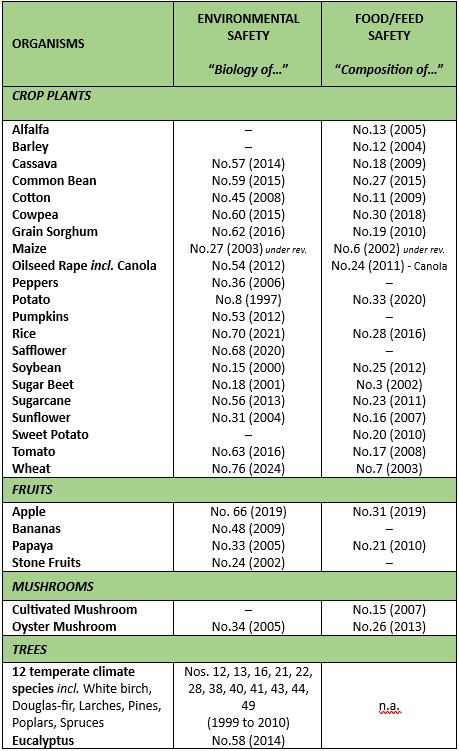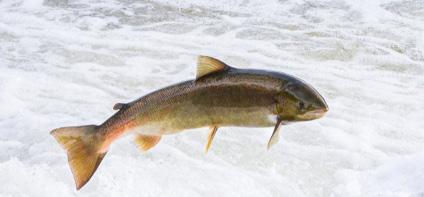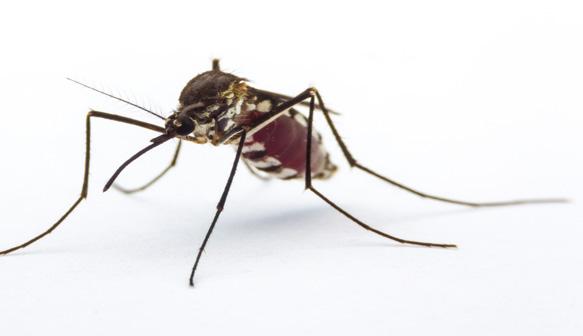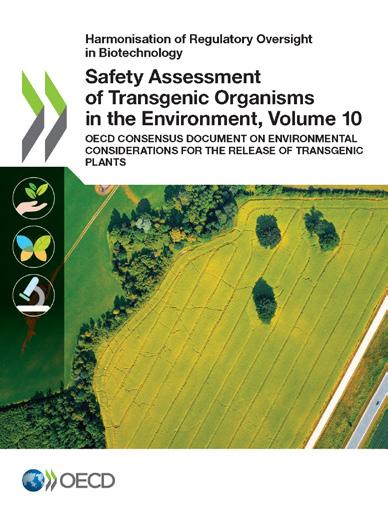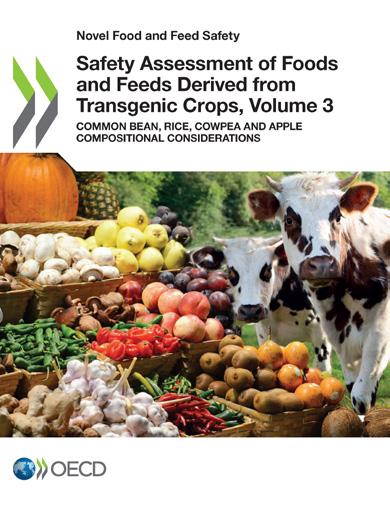OECD and Risk/Safety Assessment in Modern Biotechnology
Food, Feed and Environmental Safety
The safety of products derived from modern biotechnology is a challenging issue as geneticallyengineered crops are increasingly cultivated, and foods and feeds derived from them are marketed widely.
Modern biotechnology is applied to crop plants, animals and micro-organisms, aiming to develop varieties with new characteristics such as improved resistance, enhanced composition, adaptation to growing environment, processing aspects and other traits.
Modern biotechnology products are rigorously assessed by governments to ensure high safety standards for environment, human food and animal feed. Such assessments are felt essential for a healthy and sustainable agriculture, industry and trade.
All publications available on: https://www.oecd.org/en/topics/ biosafety-novel-food-and-feedsafety.html
These practical tools compile science-based information relevant to risk/safety assessment of transgenic varieties intended for release in the environment. In addition, key composition elements (e.g. nutrients, toxicants) are used to compare novel foods/feeds with conventional ones. After consensus is reached among countries, the documents are published in two Series: Environmental safety, and Novel Food/Feed safety.
Environmental safety
Biology of plant species: see table
Traits: resistance to virus; tolerance to herbicide; insect pest control.
Microorganisms: Pseudomonas; Acidithiobacillus; Baculoviruses; Acinobacter; Bacteria: taxonomy, detection methods, horizontal gene transfer, pathogenicity factors, Mosquitoes Aedes aegypti, In progress: An. gambiae, An. albimanus An. stephensi biology, Microalgae, updated Maize biology.
Food and Feed safety
Composition of plant species: see table.
Further reading:
Others: Safety assessment of animal feedstuffs derived from transgenic plants.
In progress: Faba bean composition, updated Maize composition.
Environmental Considerations for Risk/Safety Assessment for Release of Transgenic Plants (2023)
Consideration for Collaborative Work on the Safety Assessment of Foods and Feeds Derived from rDNA Plants (2023)
- Revised Points to Consider for Consensus Documents on the Biology of Cultivated Plants (2020)
- Molecular Characterisation of Transgenic Plants
- Low Level Presence of Transgenic Plants in Seeds & Grains
Animals
Consensus documents on the biology of animal species are available for Atlantic Salmon Salmo salar (2017) and mosquito Aedes aegypti (2018).
Documents on the biology of mosquitoes Anopheles gambiae, Anopheles albimanus and Anopheles stephensi are under preparation.
New breeding techniques
New Breeding Techniques (NBTs) is a broad term covering a range of techniques that are different from conventional breeding methods. Genome editing, one of them, is developing fast and receives increased attention.
In October 2022, both WPs agreed on a project to facilitate information-sharing on major developments related to NBTs, views on risk/safety assessment of NBT products and related regulatory issues. The first publication collating regulatory information was published in 2024. It will be updated annually.
Key events:
-Workshop on Environmental Risk Assessment of Products derived from NPBTs (2014)
-Workshop on High-Throughput DNA Sequencing in the Safety Assessment of GE Plants (2016)
-Conference on Genome Editing: Applications in Agriculture – Implications for Health, Environment and Regulation (2018)
-OECD Webinar on Animal Cell Culture for Food Production (2021)
Publications -
Compendium of Consensus Documents - Environmental Safety, Volumes 1 to 10
Volumes 1 to 10 compile the biology and other relevant consensus documents issued from 1996 to 2023.
Compendium of Consensus Documents - Novel Food and Feed Safety, Volumes 1 to 3
Volumes 1 to 3 contain the composition and other relevant consensus documents issued from 2002 to 2019.
Volume 4 will cover the 2020-2024 period (in preparation).
PRODUCT DATABASE
The OECD BioTrack Product Database allows regulatory officials to easily share information on products from modern biotechnology. These products have been already approved, after risk/ safety assessment, for commercial application (environmental release, food, feed or other use) in at least one country.
All consensus documents and the BioTrack Product Database are available, at no charge, at: https://www.oecd.org/en/topics/biosafety-novelfood-and-feed-safety.html
PRODUCTS
1. The Working Party on the Harmonisation of Regulatory Oversight in Biotechnology (WP-HROB) deals with the environmental safety of organisms produced through modern biotechnology (biosafety);
2. The Working Party on the Safety of Novel Foods and Feeds (WP-SNFF) focuses on foods or feeds derived from modern biotechnology.
Purpose of the two programmes:
1. to assist countries evaluating the potential risks of transgenic products (plants, animals, microorganisms) and ensure high standards of safety;
2. to foster communication and mutual understanding of relevant regulations in countries; and
3. to facilitate harmonisation in risk/safety assessment of biotech products, reducing costs and potential for non-tariff barriers to trade.
Participants
- OECD member countries.
- Non-member economies: Argentina, Bangladesh, Brazil, Bulgaria, P.R. China, Croatia, India, Kenya, Paraguay, Philippines, Romania, Singapore, South Africa, Uruguay, Viet Nam, others.
- International Organisations: FAO, WHO, UNEP Convention on Biological Diversity, Codex Alimentarius, others.
- Observers: Business at OECD (BIAC), African Biosafety Network of Expertise (AUDA NEPADABNE), Agriculture & Food Systems Institute (AFSI), others.





